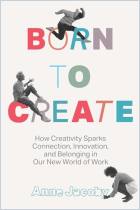Únase a getAbstract para acceder al resumen.

Únase a getAbstract para acceder al resumen.
Michael A. Roberto
Unlocking Creativity
How to Solve Any Problem and Make the Best Decisions by Shifting Creative Mindsets
Wiley, 2019
¿De qué se trata?
Business leaders can overcome six mind-sets that block creativity and innovation in their organization.
Recommendation
Michael A. Roberto’s useful analysis tells leaders how to support their employees’ creative talents. He identifies six mind-sets that block innovation. He explains their impact in terms of social science research using practices from such firms as Apple and Trader Joe’s plus examples from media, sports and the arts. Roberto shows leaders how to overcome these obstacles, create an open environment and stimulate employees’ creativity by encouraging them to explore new ways to work.
Summary
About the Author
Michael A. Roberto, PhD, is the Trustee Professor of Management at Bryant University. He also wrote Why Great Leaders Don’t Take Yes for an Answer and Know What You Don’t Know.

























Comment on this summary